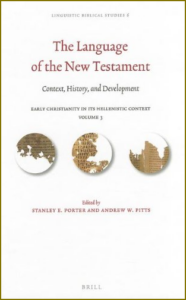Changes in complement structure from Classical to Byzantine Greek
The post below was originally published in 2017. It was among a large number of posts that were lost for several years, and I recently recovered it. I have added a brief comment below after the republished post.
 In the first issue of the Journal of Greek Linguistics of 2017, Klaas Bentein examined changes in the way verbal complements were formed between the Classical and Byzantine periods. Here’s what the abstract of his paper says:
In the first issue of the Journal of Greek Linguistics of 2017, Klaas Bentein examined changes in the way verbal complements were formed between the Classical and Byzantine periods. Here’s what the abstract of his paper says:
While Classical Greek has a particularly rich complementation system, in later times there is a tendency towards the use of finite complementation. In this context, Cristofaro (1996) has claimed that the Classical opposition whereby the accusative and infinitive is used for non-factive complements, and ὅτι with the indicative and the accusative and participle for factive ones, is disappearing, ὅτι being used as a ‘generic’ complementiser. In this article, I investigate to what extent Cristofaro’s (1996) claim of the pragmatic neutralisation of complementation patterns can be upheld, and whether it could be claimed that a new pragmatic opposition, in terms of ‘register’, is being established. For this purpose, I turn towards documentary papyri, a corpus which is particularly fruitful for socio-historical investigations.
You can read this article here here. I have added it to the Comprehensive Bibliography of Hellenistic Greek Linguistics.
The title of Bentein’s article is “Finite vs. non-finite complementation in Post-classical and Early Byzantine Greek: Towards a pragmatic restructuring of the complementation system?”
What he calls “complement structure” is referred to as “argument structure” in other theoretical frameworks and “case frames” in still others. These two alternative models both place a strong emphasis on the relations of these complements to the verb with which they appear.
Two Items Added to the Bibliography
 Today I added two items to the bibliography at Greek-Language.com. One was a paper by Paul Danove that has been around since 2013, but I have failed to add it. My apologies to Paul!
Today I added two items to the bibliography at Greek-Language.com. One was a paper by Paul Danove that has been around since 2013, but I have failed to add it. My apologies to Paul!
Danove, Paul, ‘A comparison of the usages of δίδωμι and ἀποδίδωμι compounds in the Septuagint and the New Testament’ in Stanley E. Porter and Andrew W. Pitts (eds), The language of the New Testament: Context, history and development Linguistic Biblical Studies 6, Leiden: Brill, 2013. 365–400.
The second is a paper published in the Transactions of the Philological Society in 2017. Dr. Stolk provides a well-reasoned look at prepositions (mostly πρός and εἰς) and the usage of the dative and accusative cases in phrases without a preposition. She challenges the widely accepted notion that increased use of these prepositions caused the eventual decline of the dative case.
 Stolk, Joanne, “Dative Alternation and Dative Case Syncretism in Greek: the use of dative, accusative and prepositional phrases in documentary papyri.” Transactions of the Philological Society. Volume 115:2 (2017) 212–238.
Stolk, Joanne, “Dative Alternation and Dative Case Syncretism in Greek: the use of dative, accusative and prepositional phrases in documentary papyri.” Transactions of the Philological Society. Volume 115:2 (2017) 212–238.
Transliteration versus Translation
A number of highly important words in translations of the Bible are in fact not translated at all, but merely transliterated. A translation is a rendering of the meaning of a text into a different language. A transliteration does not render the meaning of the word into the other language, but only represents its sound. βασιλεύς, for example, can be translated into English as king. Transliterated into English, it would be Basileus.
Clearly, transliterating this word into English would not make its meaning clear. It would, in essence, hide the meaning and give us a new English word, which we would then have to explain to readers of the text. This is exactly what happened with quite a few theologically important words in the earliest English translations of the Bible. Rather than translating them into English, the earliest translators chose to transliterate them, representing their sound rather than their meaning in English. In most cases, these transliterations were accepted by the churches of the time and became traditional usage in the new languages into which the Bible was translated, with the church providing new “official” meanings for these words.
Four examples of such transliteration still found in our modern English Bibles are shown below.
| Original Language Word | Translation | Transliteration |
|---|---|---|
| βαπτίζειν | dip, wash, rinse | baptize |
| χριστός | anointed | Christ |
| מַשִׁיחַ | anointed | Messiah |
| χριστιανός | of the party of the anointed | Christian |
Why do you think the earliest translators chose not to translate these word, but to transliterate them? What could happen if we chose now to actually translate them rather than continuing to use the transliterations given to us by those early translators?
Ἐγὼ μὲν ὑμᾶς βαπτίζω ἐν ὕδατι εἰς μετάνοιαν (Matthew 3:11)
I dip you in water for repentance
I wash you with water for repentance
I rinse you with water for repentance
At the very least, in the case of βαπτίζω, we would have to think very hard about which English word best represents the sense of the Greek word in each particular context. Continuing to use the transliteration baptize hides this problem from us

